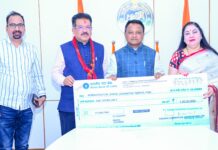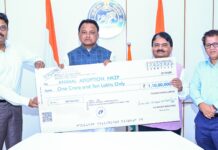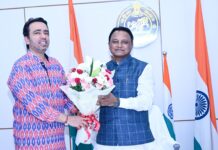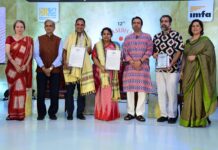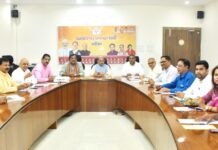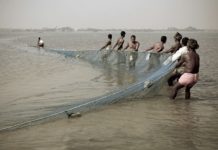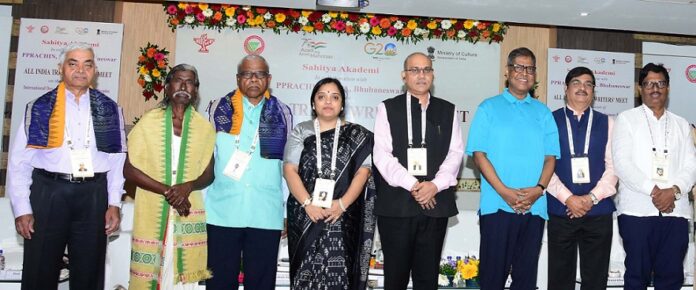By Our Correspondent
BHUBANESWAR: Nearly 40 per cent of the world’s 7,000 languages including dialects spoken by indigenous people groups had already disappeared and several of them were on the verge of getting extinct, experts said on Wednesday.
“The world is facing the danger of losing its languages several of which are already listed as endangered and loss of languages equates loss of culture,” Dr. K. Sreenivasarao, Secretary of the Sahitya Akademi, said while addressing the inaugural program of the two-day All India Tribal Writers’ Meet which began at Siksha ‘O’ Anusandhan (SOA) here.
The two-day conference, which has attracted around 70 tribal writers from different parts of the country, has been organised by the Sahitya Akademi in collaboration with Centre for Preservation, Propagation and Restoration of Ancient Culture and Heritage of India (PPRACHIN), the conservation arm of SOA to mark the International Day of World’s Indigenous People celebrated on August 9.
Affirming that these indigenous people groups were the repository of world’s culture, Dr. Sreenivasarao said “if we don’t care now, we will lose the culture and the associated ancient knowledge system which these communities possessed.”
The Sahitya Akademi, he said, was engaged in translation and publication of tribal literature into English and other Indian languages.
The event, which was inaugurated by Dr. Haladhar Nag, celebrated writer and Padmashree awardee, was attended by eminent scholar Prof. Jagannath Das, eminent writer and Sahitya Akademi’s Convenor of the Odia Advisory Board, Dr. Gourahari Das, Santhali writer and Convenor of Sahitya Akademi’s Santhali Advisory Board Mr. Chaitanya Prasad Majhi and eminent writer and Head of PPRACHIN, Dr. Gayatribala Panda. Eminent linguist Dr. Debi Prasanna Patnaik was also present.
Prof. Pradipta Kumar Nanda, Vice-Chancellor of SOA, presided over the program which was conducted by Prof. Jyoti Ranjan Das, Dean (Students’ Welfare).
Dr. Nag, who addressed the inaugural session in his native ‘Koshali’ language, said he had studied up to Class three but had delved into literature as it was a way to show the path to the society. “My writings have been translated into other world languages and transcended international boundaries in spite of the fact that I have not studied much,” he said adding some of his writing have become part of the curriculum in several universities.
“My writings are rooted to the soil where I live and literary creations which show the way to the society are timeless,” he said.
Prof. Jagannath Das, who delivered the keynote address, said the tribal people, unlike those influenced by modernity, don’t drift away from their culture. “Tribal people are inexorably linked to nature like hills, rivers and streams and express their feelings from the heart. “We need to listen to their poetry and appreciate the same,” he said.
Dr. Gourahari Das appreciated the decision of Sahitya Akademi and PPRACHIN to hold the tribal writers’ conclave describing it as an important venture while underscoring the need for documentation of tribal literature. He also thanked SOA Founder President Prof. (Dr.) Manojranjan Nayak, who was present, for contributing to the growth of tribal literature through such measures.
Mr. Majhi said around 40 per cent of the world’s 7,000 languages had already become extinct while calling for urgent steps to arrest this trend. He said UNESCO had declared the years between 2022 to 2032 as the International Decade of Indigenous Languages for their protection and propagation.
Pointing out that specific script for specific language provided it the needed identity, he said the script for ‘Saura’ and ‘Ho’ tribal languages had already been developed.
Dr. Panda said PPRACHIN was involved in some major programs including publication of critical edition of the original Sarala Das Mahabharat which involved digitalization, translation, prose rendering, production of corpora, dictionary and literary encyclopedia of Sarala Das.
The ‘Adi Parva’ edition of Sarala Mahabharat was released on the occasion. Ten of the 18 ‘parvas’ of the epic had already been published by PPRACHIN.
Dr. Panda said it was necessary to preserve the valuable components of tribal culture in general and that of tribal folklore in particular in a systematic manner before they became extinct.
Different sessions of multilingual poetry reading, short story reading and analysis of tribal songs, Saora art and script marked the opening day’s program.


